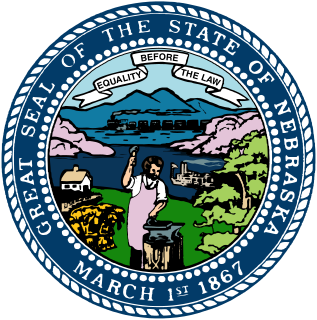
Geary County is a county located in the U.S. state of Kansas. As of the 2010 census, the county population was 34,362. Its county seat and most populous city is Junction City. The county is named in honor of Governor John W. Geary.

George Reginald Geary, was a Canadian politician. He was a Conservative member of the House of Commons from 1925 to 1935. He also served as Mayor of Toronto, Ontario from 1910 to 1912.

Seth Padelford was the 31st Governor of Rhode Island from 1869 to 1873.
George Alonzo Coe was an American politician from the U.S. state of Michigan. He served as the 11th Lieutenant Governor of Michigan.

The 1860 New York state election was held on November 6, 1860, to elect the Governor, the Lieutenant Governor, a Canal Commissioner, and an Inspector of State Prisons, as well as all members of the New York State Assembly. Besides, the question of Negro suffrage was asked, and was answered in the negative with 197,503 votes for and 337,984 against it.

The 1868 New York state election was held on November 3, 1868, to elect the Governor, the Lieutenant Governor, a Canal Commissioner, an Inspector of State Prisons and the Clerk of the Court of Appeals, as well as all members of the New York State Assembly.

The 2010 Nebraska gubernatorial election was held on Tuesday, November 2, 2010 to elect the Governor of Nebraska, who will serve a four-year term to begin in January 2011. Republican incumbent Dave Heineman won, defeating Democrat Mike Meister. Heineman easily won his party's nomination. Mark Lakers ran unopposed in the Democratic primary, but dropped out in July 2010. Attorney Mike Meister was chosen as a replacement.
Jeremiah J. Nordquist is a politician from the state of Nebraska in the Midwestern United States. Nordquist represented an Omaha district in the Nebraska Legislature from 2009 to 2015. He is a member of the Democratic Party.
The 1875 United States Senate election in New York was held on January 19 and 20, 1875, by the New York State Legislature to elect a U.S. Senator to represent the State of New York in the United States Senate.

Elections were held in Nebraska on November 2, 2010. Primary elections for the Republican Party and Democratic Party, as well as a nonpartisan primary for members of the Nebraska Legislature, took place on May 11, 2010.
The United States Senate elections of 1874 and 1875 had the Democratic Party gain nine seats in the United States Senate from the Republican Party. Republicans remained in the majority, however.

The Pennsylvania gubernatorial election of 1866 occurred on October 9, 1866. Incumbent governor Andrew Gregg Curtin, a Republican, was not candidate for re-election. Republican candidate John W. Geary defeated Democratic candidate Hiester Clymer to become Governor of Pennsylvania.

The Pennsylvania gubernatorial election of 1872 occurred on October 8, 1872. Incumbent governor John W. Geary, a Republican, was not a candidate for re-election. Republican candidate John F. Hartranft defeated Democratic candidate Charles R. Buckalew to become Governor of Pennsylvania.

The 2015 Christchurch Borough Council election took place on 7 May 2015 to elect members of Christchurch Borough Council in Dorset, England. The whole council was up for election and the Conservative party stayed in overall control of the council.
The 1869–70 New South Wales colonial election was held between 3 December 1869 and 10 January 1870. This election was for all of the 72 seats in the New South Wales Legislative Assembly and it was conducted in 52 single-member constituencies, six 2-member constituencies and two 4-member constituencies, all with a first past the post system. Suffrage was limited to adult white males. The previous parliament of New South Wales was dissolved on 15 November 1869 by the Governor, Lord Belmore, on the advice of the Premier, John Robertson.

The Vermont gubernatorial election of 1869 took place on September 7, 1869. Incumbent Republican John B. Page, per the "Mountain Rule", did not run for re-election to a second term as Governor of Vermont. Republican candidate Peter T. Washburn defeated Democratic candidate Homer W. Heaton to succeed him. The 1869 election was the final time the Governor of Vermont was elected for a one-year term, changing to a two-year term at the 1870 election.

The Vermont gubernatorial election of 1869 took place on September 8, 1868. Incumbent Republican John B. Page, per the "Mountain Rule", successfully ran for re-election to a second term as Governor of Vermont, defeating Democratic candidate John L. Edwards.

Virginia's elections of 1869 occurred during the post-American Civil War Reconstruction Era and included African-American candidates and so-called "carpetbaggers", politicians from the North, often former Union Army officers, who ran in elections in southern states then under the authority of the Federal government and U.S. Army. The election included the 1869 Virginia gubernatorial election held on July 6, 1869 to elect the governor of Virginia. Gilbert Carlton Walker was elected as a "True Republican" defeating H. H. Wells, who was running as a "Radical Republican." Walker switched his party affiliation to Democratic in 1870.

Edward Andrew Geary was an American politician and farmer from the state of Oregon. He was a Republican who served eight years in the Oregon House of Representatives. In the house, Geary represented a large rural district in southern Oregon. He served as Speaker of the Oregon House of Representatives during the 1955 legislative session. He also served as acting governor of Oregon for several brief periods in the mid-1950s.
















